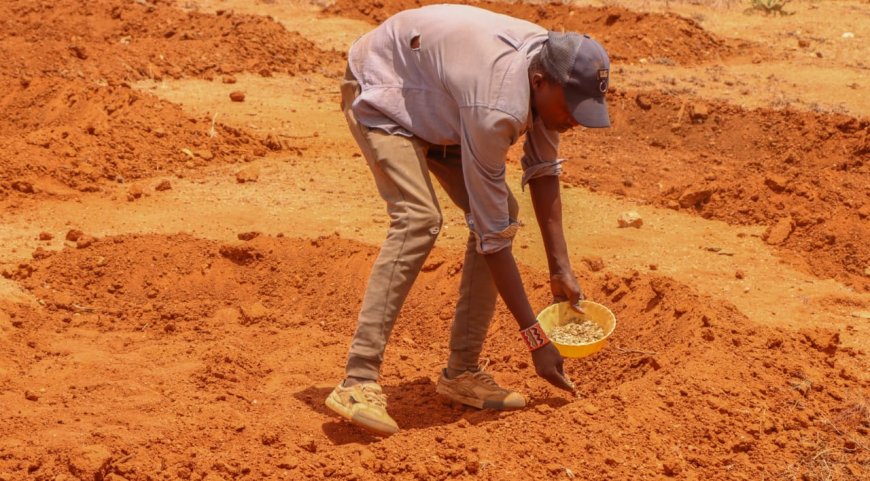Laikipia Pastoralist opts to replenish pasture

Nanyuki,
Thursday, September 14, 2023,
KNA by Muturi Mwangi
Pastoralist communities in Laikipia County have now ventured into grass reseeding initiatives on bare fields to replenish pasture that was depleted during the prolonged dry spell
The move was to avert losses during the drought in Arid and Semi-Arid (ASALs) counties that left a trail of destruction including livestock death and conflict over limited resources,
The Ingwesi, Lekuruki, and Mayanat pastoral communities in Laikipia North sub-county have put over 60 hectares of community land into grass reseeding initiatives that they reveal would save their livestock from dying due to lack of pasture and at the same time reduce movement in search of that precious commodity.
Lekuruki community Conservancy secretary Richard Legei says that the grass reseeding further helps in land restoration that had been degraded due to climate change.
“Our aim was to do land restoration because the world has changed to the worse, we decided as a community to set aside a section of land for grass reseeding, “reveals Legei
The communities which are funded by the Food Agriculture Organization (FAO) and implemented by Community Forest Association (CFA), Legei says that their target is to replicate the grass reseeding initiative into about 6664 hectares of land after their first phase of reseeding becomes successful.
“If this project of grass reseeding is successful in our demo areas, we aim to replicate the same to the entire community, thanks to CFA and FAO for supporting us with grass seedlings and capacity building to the community on the importance of land restoration,” Legei notes.
The initiative calls for severe dedication and sacrifice to restore the ruined land and ensure the whole community which are traditionally livestock keepers benefit with pasture for their cattle.
Community members are engaged in their mission of making semi-circular buds for grass reseeding ahead of the expected Elnino at Mayanat community land, Laikipia North sub-county.
Legei notes that residents are encouraged to keep off sections under grass reseeding demonstrations till the project bears fruits.
“The rainfall is not sufficient here but in the initial stages, when the grass was mature, we drove in a few numbers of livestock to feed on for the duration of two weeks. It was a big relief to the community. You can see a big difference even from a distance; the land is not bare unlike before. We want to ensure there is impact, until then, residents should keep off,” says Legei.
Lekuruki Community Conservancy Regular Management Officer Thomas Sakui says that before the community's land rehabilitation through grass reseeding initiatives, their land was completely bare due to increased population and human activities.
“We have accrued a lot of benefits through grass reseeding initiatives including restoration of our land that was bare only invaded by invasive species. The land is now useful and productive. The community gets pasture here through grazing,” says Sakui.
He says that they learned the innovative idea of grass reseeding from Kuku ranch from the area and hence replicated the same.
He reveals, that earlier, the land was not beneficial but now their livestock can get pasture, thanks to the grass reseeding initiatives.
Community Forest Association(CFA) administration officer Serenua Lebere says that they have supported the community to also eradicate invasive cactus plants on over 500 acres of land which they now do for grass cultivation.
“Over 500 acres have been reclaimed by removing opuntia stricta and now we are planting grass. Our community can now access pasture easily and at the same time normal migration has declined,” reveals Lebere.
FAO project officer Patrick Mugi says that grass reseeding initiatives aim to support the government on achieving 15 million trees since the pastoral communities would not have to graze in the forest since they have enough feed for their livestock outside the forest.
“We are supporting the government of Kenya in its 15 billion trees target and that’s why we are working in Mt Kulalu and Mukogodo forest by supporting the communities to do tree planting and grass reseeding in the grasslands by doing semi-circular buds and valley running systems which are water conservation structures,” says Mugi.
He points out that the reseeding reduces logging and forest encroachment that was seen before.
“When the community has enough feed, they do not have to go to the forest for pasture and this reduces encroachment and logging that was witnessed before. Through this, we encourage regeneration of our forests and grasslands,” the FAO officer points out.
Mugi reveals that FAO was also undertaking grass reseeding in Isiolo and Marsabit County respectively.
He says some of the grass species they use for reseeding are African Fox tail, Bush Rye and Maasai love grass which are easy to adapt and grow.
Meanwhile, according to the National Drought Management Authority (NDMA) recent report, about three million cattle, sheep, goats and camels died in the 23 ASALs counties, a situation pastoral communities in Laikipia have vowed would never happen again.
Courtesy; KNA
What's Your Reaction?































































































































































































































































































